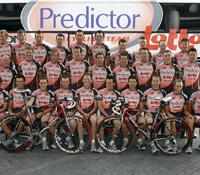
Recently on Cyclingnews.com |
Tales from the peloton, March 20, 2007
An unusual doping test result
Anti-doping testing goes back many decades, and while the testing may have been neither as sophisticated nor as thorough, there were still plenty of opportunities for rumors about the results. Les Woodland tells the tale of of one particularly unusual testing outcome.
Operaciòn Puerto is no more in the Spanish courts, which will sadden nobody even if its very existence annoyed more than a few. There weren't many laughs in it. So let's cheer ourselves up with an odd tale from the other end of dope-testing history.
It's the case of the rider who passed a drugs test but was told he was pregnant. We even know the name of the man concerned.
The background is that in the 1960s, what were discreetly called "medical controls" were both elementary and easily defrauded. They were elementary to the extent that they were clumsily carried out, that the test labs weren't always as good as they might have been, and that the law surrounding them was very new and easily challenged.
They were also very unsubtle, or at least the riders were, for in the view of Jean-Pierre de Mondenard, a French doctor who has spent decades chronicling drug-taking in all sports, you'd only get a positive result if you'd taken enough to pep up a stallion.
Jacques Anquetil, while he spoke for the right to take drugs, was even more concerned about the way the clumsy laws and the unequal way the tests were carried out. He walked away from his hour record at the Vigorelli track, you'll remember, because he refused to suffer what he saw as indignity not befitting a champion of having to walk into a makeshift tent in the track centre and pee while thousands of fans looked on.

|
Anquetil therefore enjoyed stories such as the one about a Belgian rider who'd defrauded a test by submitting someone else's urine only to find that the man who'd helped him had himself taken drugs. And that that man had been a policeman. True or not, they underlined his point that cyclists were professionals and deserved the same care, dignity and respect as anyone else who worked hard for his living.
In 1967, Anquetil didn't ride the Tour. He had no shortage of offers to fill his time when the race was on, though, and he wrote a series of articles for the Sunday paper France Dimanche. He went into all the little tricks and hidden scandals of cycling, telling all, and being banned for his trouble from riding the national and the world championships.
The story that most made Anquetil's point about haphazard dope tests was the one he told on July 11 about a Dutch rider called Piet Rentmeester. Hardly a man to set the world of cycling on fire, Rentmeester: he won Kuurne-Brussels-Kuurne in 1962 but not a great deal else worth recalling. But, in an era when Holland had few or no pro teams of its own, he was good enough nevertheless to get a place with foreign sponsors such as Peugeot and Leroux. But no so good, doubtless, that Anquetil even knew who he was. Except for a good story.
"After a race in his home town," Anquetil wrote, "the Dutchman was asked to urinate in a flask."
"'I can't,'" he replied.
"'Well,' an official told him, 'we can't hang about here. Go back to your house, fill up the bottle as soon as you can and bring it back to us.'"
"Three hours later, Rentmeester brought back the filled bottle. Two weeks later, after the analysis, he was told that there was no trace of dope. But on the other hand, whoever had urinated in the bottle was undeniably… pregnant. For the good reason that it was Mrs Rentmeester."
To nobody's surprise, and because Rentmeester was too small a rider to bother to ask, the story passed into legend. It became an accepted truth. But eventually someone decided to find out for himself. It had dawned on Leon Schattenberg, the Dutch federation doctor, that dope tests weren't pregnancy tests. Not then, anyway. Nowadays there's a test which would show up pregnancy because it's looking for hormones. But then testers were looking only for amphetamine and not a great deal else.
So Schattenberg went to Rentmeester's house in Yerseke and asked him: Had it ever happened? And the answer, of course, was that no it hadn't. I don't suppose Anquetil had just made it up; he'd have thought it was true because the tale had spread round the peloton. By the time he heard it and passed it on, it was best part the way to being true and the fact that it concerned a minor rider that few people had heard of just made it all the better.
What Rentmeester made of it, I don't know. Probably he was just amused, perhaps delighted that he had gained a little notoriety, no doubt aware that one man alone can't deny a story which has put on its boots and run round the world.
What became of him? Well, he never made much money from cycling, that's for sure. In fact his biggest money-spinner came from walking through the crowds at criteriums and selling race caps. Being a clever man, he realised there was more money for less effort there than there was in cycling, for which anyway he was getting too old. He began buying more and more caps and more and more souvenirs and opened a business specialising in them.
The business profited just as much and some time later Rentmeester sold it for a good profit and in time became a retired businessman who, the last I heard, still enjoys getting out on his bike now and then. But this time just for the fun of it and without any doctors' bottles to fill afterwards.
